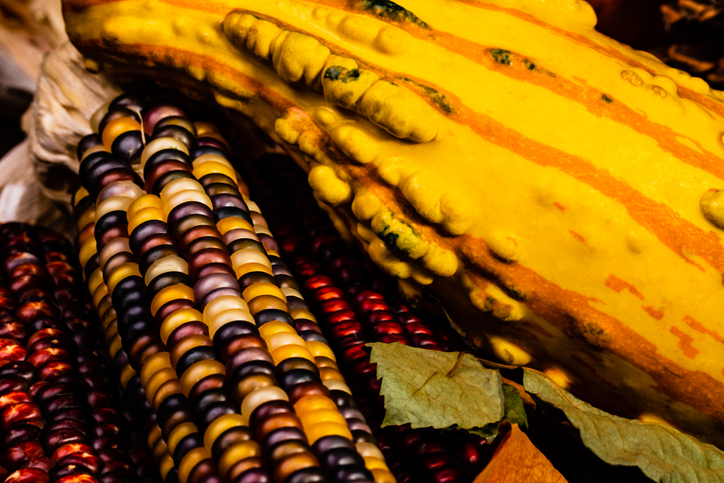
4 Myths About Thanksgiving

LET US BREAK BREAD TOGETHER: ‘The First Thanksgiving,’ painting by Jean Louis Gerome Ferris. Is this an accurate portrayal of the holiday’s origins? (Image: Wikipedia)
Turkey, honey baked ham, candied yams, collard greens, casseroles, rice and gravy, corn bread, rolls, dressing, cranberry sauce, macaroni and cheese, sweet potato pie, carrot cake, pound cake, chocolate cake… When I think of Thanksgiving I think of food, family, fellowship, and laughter; but most of all, I think of food. Most of us do. But is that why we celebrate Thanksgiving?
What are we celebrating? What should we be thinking about? As Christians, we are encouraged by our churches to use Thanksgiving to be reflective about the many blessings that God has bestowed upon our families, friends, and loved ones, how God has given us health, favor, grace, mercy, and even performed miracles on our behalf. But shouldn’t we do that all the time? Is this why we celebrate Thanksgiving?
Is Thanksgiving as we know it a myth? Years ago, elementary schools taught that we celebrate Thanksgiving to remember the Pilgrims and the Indians in a time when the Pilgrim travelers were doomed to die as the winter months approached and they did not know how to survive in a new land. We learned how the Indians were hospitable to the strangers and fed them, befriended them, and taught them the way of their land. We learned that the Pilgrims and the Indians ate a large meal in the late 1690s, which has been recorded in history as the first Thanksgiving. Since then, Americans have made it a tradition to take a day around that time of year to remember the sacrifice, the food, and the friendship that got them through. That’s touching, but we know now that the story is largely inaccurate.
Maybe if we consider some of the myths that are associated with Thanksgiving, we can get a better understanding of what this national day can be in our lives.
Myth 1: “The first Thanksgiving” occurred in 1621.
Harvest celebrations were ancient traditions for both the Pilgrims and the Native Americans. In fact, the Bible mentions entire festivals around harvest time. Most African cultures also celebrate the harvest. While the “first Thanksgiving” idea is not historically true, it is true that we should use this holiday as a special time for celebrating what God has placed in our lives as we open the season with prayer and praise.
Myth 2: The colonists came seeking freedom of religion in a new land.
Actually, the people who came on the Mayflower were seeking religious freedom only for themselves. They didn’t know or really care to know how the native people worshipped; they showed little concern for the Indians’ freedom of religion. Unfortunately, it’s easy to be selfish about our own rights while overlooking other people’s needs. Today, however, each of us can use this Thanksgiving holiday to thank God that we all have the freedom to worship Him. (This might even be a time to reflect on how religious freedom is still opposed in some countries today.) The bottom line is that today in the United States we do have the freedom to worship God and to give Him thanks for all He is. Use this Thanksgiving to do that!
Myth 3: The Pilgrims invited the Indians to share their food and celebrate the first Thanksgiving.
Massasoit, leader of the Wampanoag Indian tribe, was concerned that the English colonists might be preparing for war. He led 90 men to investigate the sound of gunfire from the Plymouth colony. When it turned out that the gunshots were from hunters gathering food for the harvest celebration, Massasoit and his men returned with five deer and many turkeys–probably more than the colonists were able to provide!
Perhaps that is why the poor turkey is still the favorite bird of Thanksgiving today. In fact, another myth says that the Pilgrims and Indians feasted on turkey, potatoes, berries, cranberry sauce, pumpkin pie, and popcorn. The menu actually included venison, wild fowl, corn porridge, and mashed pumpkin.
But whether you celebrate with turkey or tofu (pooh!), make sure that this Thanksgiving you celebrate with others. They may be family or friends. You may even organize a group to help serve turkey dinners at a shelter. The food doesn’t matter. (OK, maybe tofu does.) The main thing is to celebrate God and enjoy time with family, friends, and others who are special in your life.
Myth 4: The Pilgrims and Indians became great friends.
Sadly, history proved otherwise, as within a generation the English colonists fought against the Indians to take their land. Today, Native American people often see Thanksgiving as a reminder of the legacy of betrayal and mistreatment their ancestors suffered. That pain is real as is the pain that many people feel today who are rejected or lonely or have found abuse or violence in their lives. Jesus calls on us as Christians to display brotherly love. This Thanksgiving, take time to look around at those who are suffering and to lend a hand where you can. Maybe there is a kid at school who needs a friend, or an older person who needs some help. The pain of that “first Thanksgiving” relationship cannot be changed. But you can use this Thanksgiving to help ease the pain of someone else.
As Christians, we are called to uphold truth, but more importantly, we are called to love humankind. This Thanksgiving, take time to show love to your fellow brothers and sisters by volunteering at a soup kitchen or food pantry. Follow the example of the Native Americans and be generous. This Thanksgiving, above all (tofu aside), make sure you love your neighbors.

